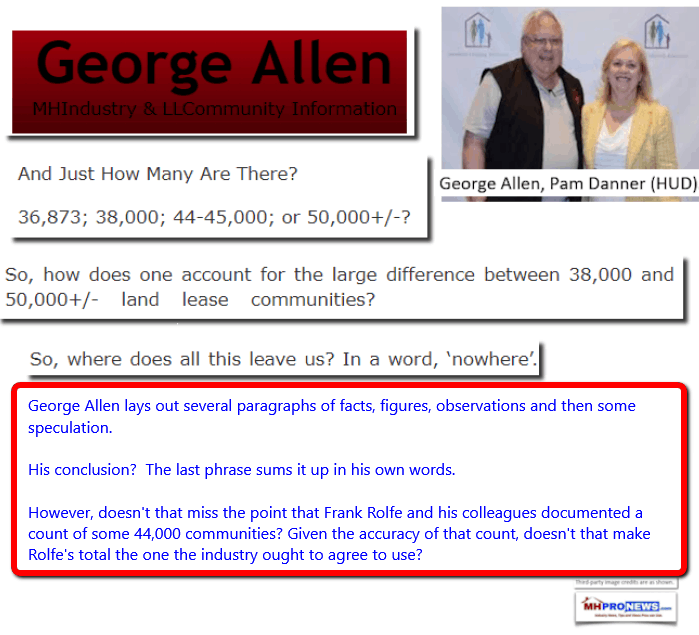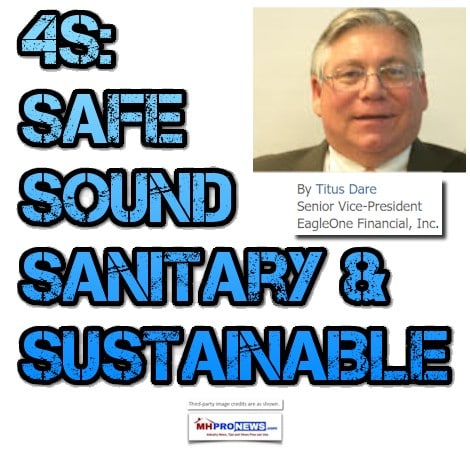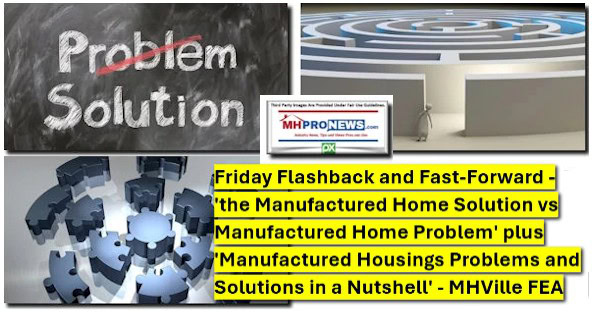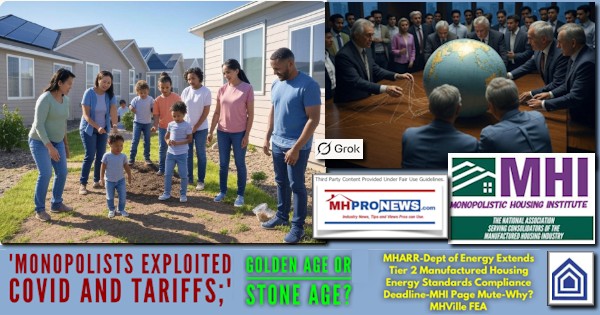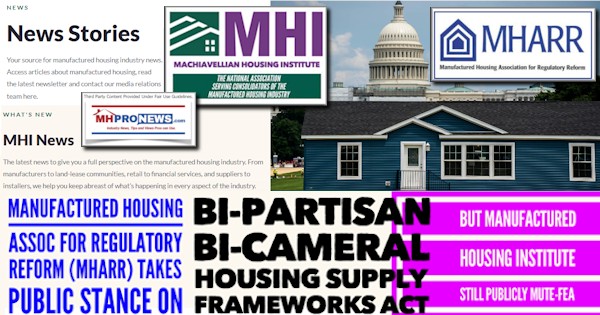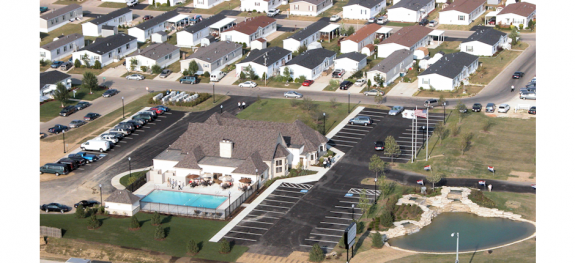
First reported here on the Daily Business News, others in the manufactured home publishing arena have since picked up and carried on their own expressed concerns and/or claims about the number of communities there are in manufactured housing industry.
Why Does the Controversy Matter?
Several reasons, which this report/analysis will explore.
First, it clearly matters enough to those writing – Frank Rolfe, his partner Dave Reynolds and George Allen – to take the time to write it. They are in the community space themselves, their operations are members of the Manufactured Housing Institute/National Communities Council (MHI/NCC).
Let’s briefly see what they’ve said.
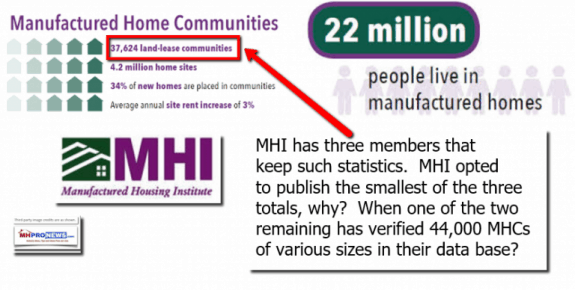
George Allen on Community Controversy
George Allen, who’s blog laid out his case, revealed in the graphic below with key phrases from his column, summarizing Col. Allen’s key points. Paragraphs of comments are on Allen’s site on this issue, so the below are the bullets. His bottom line is that we can’t know the total, but he clearly felt it worth exploring.
Frank Rolfe/Dave Reynolds on Community Count Controversy

In an email to MHProNews and others, the partners in “Mobile Home University,” MHP Funds, RV Horizons and other ventures had this key point.
“It took two of our employees two years to assemble this list. They started with the phone book. Then they augmented that with visual searches from aerials, discussions with city planning departments, and other unique sources. The end result was the complete list of parks in the U.S.”
Why Community Count Matters, Per Frank Rolfe
In a statement to MHProNews, Rolfe said that this issue relevant to the industry for a variety of good business reasons. Those included, but may not be limited to:
- Lenders want sound, accurate data about the industry (to Rolfe’s point, think GSEs/FHFA – lack of data is the reason the GSEs have given),
- Investors also want sound accurate data about the industry,
- Media wants useful information too, and Rolfe’s positions on MHI and their general lack of media engagement have been published here previously (example below), and also drew extensive comments at an industry association function, where Rolfe told MHPros – see the videos – some of his thinking on the importance of the industry getting accurate information out about the industry and communities.
MHI is Responding to “The Heat,” But Are Doing so Indirectly
After months of pressure from their own members and the industry – not limited to Frank Rolfe, MHARR, or MHProNews – there are at least three cases in recent months of various types of media engagement by MHI, that were not their previously critiqued advertorials.
Two of those three involved communities, and specifically the number of communities and closures.
The Washington Post, and Fredericksburg Free Lance-Star cited MHI’s SVP, as follows per the Star, “”We see these cases [manufactured home community closures] every week,” said Rick Robinson, general counsel of the Manufactured Housing Institute, which has launched a task force to combat what it believes are local government efforts to regulate trailer parks out of existence.”
What else did Robinson say that may not have made that editor’s cut? We don’t know, because Robinson and MHI won’t say. Yet, that information would be useful and was supplied to MHProNews for years, until MHI President Richard “Dick” Jennison, per sources, decided to do otherwise.

But that article in the Star was focused on the tear jerking story of community closures, and how they impact – harm citizens. The Fredericksburg paper citied some problematic figures, which deserve to be corrected. But once more, without MHI’s cooperation, that is a task made more difficult.
So incorrect information about the industry, and the number of homes, and communities stands.
Here’s one of several problematic points, quoted from the Lance–Star:
“Mobile homes [sic] are vanishing even as the cost of living in major metropolitan areas creeps steadily upward. In the early 2000s, there were 8 million manufactured homes in the country. Today, there are about 6.3 million, according to census estimates. The disappearances come in clusters.
In Richmond, 24 families were forced out after a 2014 housing code-violation sweep, prompting a federal discrimination lawsuit that resulted in new policies geared toward protecting mobile-home [sic] communities. In Palo Alto, California, nearly 400 mobile home residents are fighting to keep the city from shutting down their park to make way for new condominiums and apartments.”
A recent report on the Daily Business News analyzed a Huffington Post report by Sophie Quinton, which read in part as follows:
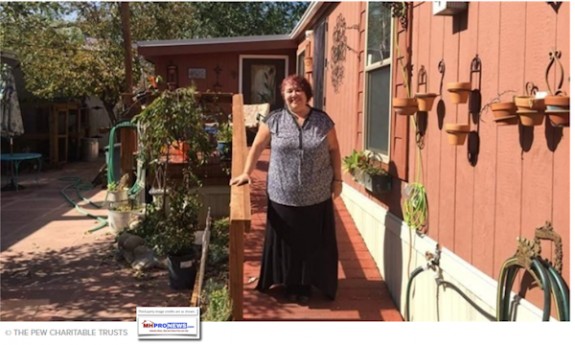
“The Manufactured Housing Institute, an industry group, said it doesn’t appear that parks are closing down more often today than in the past. But in many parts of the country, affordable housing advocates say market conditions make it tempting for park owners to sell to a developer.” (Note, Italics added for emphasis.)
Concerns over community closures are what’s fueled DNC Vice Chair and Congressman Keith Ellison (D-MN) to push for new federal law about this issue. See that report, linked here.
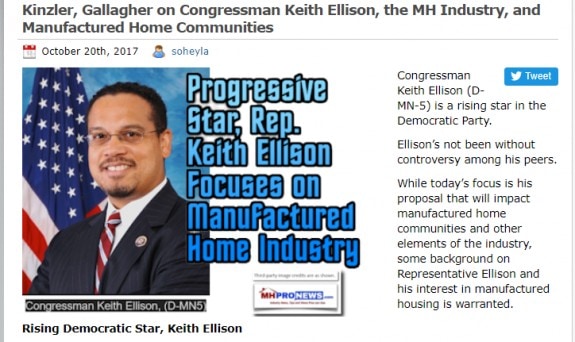
Frank Rolfe’s Upcoming New Video Statement…
In a not yet produced video segment for MHProNews, Rolfe says on camera in front of dozens of industry pros words to the effect that many in the media believe that community closures are part of the industry’s business model.
Rolfe has spoken with several mainstream media outlets over the past few years. If that impression of his is accurate, that is a serious issue to the industry, community owners and investors.
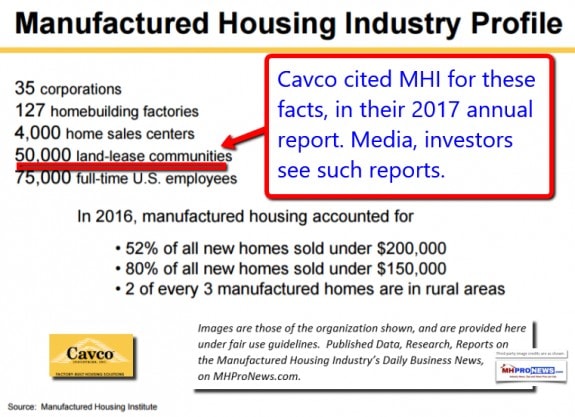
MHI’s statistical contradictions and inaccuracy – as recently as checked yesterday for this report – could be fueling concerns for serious researchers, for the GSEs, etc. These contradictory, problematic graphics by and citing MHI, are accurately reflected in this fact-check report. The hope is to get MHI to correct their factual errors.

If in fact Rolfe is correct – and many in media believe that the industry has a common business model of holding land-lease communities only until they are sold off for redevelopment – that in turn fuels comments from the public previously cited by MHProNews.
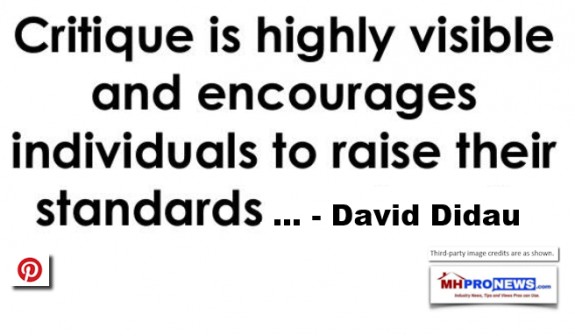
Variations of a common commented posted by the general public on articles related to manufactured home community closures reads like this, “never buy a home on rented land.”
That kind of concern is reflected by Paul Bradley’s statement to MHProNews quoted below.
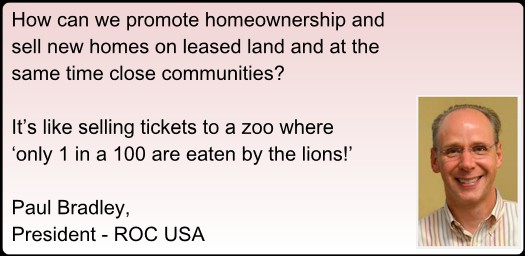
“One way to address this is to segment true homeownership land lease communities and differentiate it from traditional ‘parks’ where closure remains a risk, not a certainty but a risk.
Then, we can promote secure homeownership through an image campaign with good fundamentals. I think it’s our saving grace in public perception and our path to GSE home only financing, too!”
Bradley, it should be noted, enjoys one of the few pilot programs with a Government Sponsored Enterprise (GSE), see that report, linked here.
Factory-Built Home Finance Professional, Titus Dare’s Take
Titus Dare blasted MHI’s advertorials, as he said in his own words, linked here.
But finance professional Dare also laid out his 3 point case for industry advancement, linked here. His summary read in part, “End the Fear, and the Growth Will Follow,” emphasizing that ““Come on in the water is fine” won’t work when trying to get the FHFA, GSEs or anyone else to come to the manufactured housing table on doing long term chattle-style (home only) mortgage lending.”
As a career banker and a true believer that MH can, and will, solve our housing crisis in America,” Dare told MHProNews in that linked op-ed.
When he stresses education, it clearly implies education that is fact based and accurate. In Dare’s own words, he stressed what Rolfe did to that live audience in current and upcoming videos.
Calling on MHI to Correct and Maintain an Accurate Record
Based on our own experiences, it would take perhaps an hour or two tops for MHI to correct their reporting of the community count and update their graphics on their website.
Shouldn’t such an update be promptly done? And shouldn’t it also be accompanied by an explanation/apology, that admits past confusion, but now commits to keeping the record straight moving ahead?
As it currently stands, MHI has documents and graphics that MHProNews and MHLivingNews have spotlighted as factual errors. It seems possible – even likely, based upon some of the mainstream media accounts noted above and others – that failure to do so is leading to avoidable doubt and skepticism.

Rolfe, Reynolds, MHARR, MHProNews and others have directly and indirectly urged MHI to correct and maintain an accurate repository of information. What possible reason can they give for not doing so promptly?
As Rolfe has noted, investors, lenders, media, and the public are watching. The GSEs want accurate data.
While accurate information isn’t the only issue that faces the industry, it is one that could be rapidly addressed and resolved. Isn’t it a worthy topic for the MHI/NCC Chicago meeting this week?
“We Provide, You Decide.” © ## (News, analysis, fisking, commentary.)

(Image credits are as shown above, and when provided by third parties, are shared under fair use guidelines.)

Note: Soheyla Kovach is a co-founder and managing member of LifeStyle Factory Homes, LLC, the parent company to MHProNews.com, MHLivingNews.com and manufactured home industry focused business development services.

